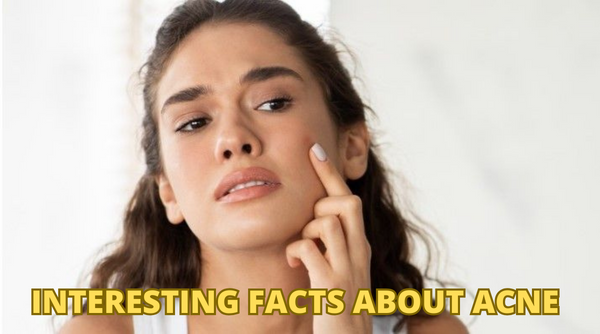Interesting Facts About Acne 2024
8 Surprising Facts About Acne
Have you ever utilized more than twice a day to wash your face to get rid of acne? Do you keep away from greasy meals and chocolate in the hopes that you will not see anymore imperfections when you look in the mirror? Have you ever upped your water consumption, avoided specific foods, or exercised more to stop acne flare-ups? You are not alone if you suggested yes to any of the above questions.
Among the most prevalent skin conditions, acne impacts around 85% of the population. While there are increasingly more effective treatments for acne, there are also increasingly more mistaken beliefs about how to handle the issue.
A cure for acne has not yet been found, despite the fact that brand-new therapies are being developed daily. As a result, according to a physician, numerous patients choose to self-treat or try alternative solutions. However, a lot of these treatments are based on hearsay and have not gone through comprehensive clinical screening. According to the survey, these myths continue to influence how clients treat their acne.
Acne is a common skin condition that affects millions of people worldwide, but there are still some surprising facts about acne that many people may not be aware of.
- Hormonal Fluctuations: Hormonal changes, particularly during puberty, can trigger acne breakouts. However, hormonal fluctuations can also occur during pregnancy or due to certain
- medical conditions, leading to acne in adults.
- Genetic Predisposition: Acne can run in families, suggesting a genetic predisposition to the condition. If your parents or close relatives had acne, you may be more prone to developing it as well.
- Stress and Acne: Increased stress levels can exacerbate existing acne or even trigger new breakouts. Stress stimulates the production of hormones like cortisol, which can increase oil production and inflammation, leading to more severe acne.
- Diet and Acne: While it was once believed that diet had no impact on acne, recent research suggests that certain foods may contribute to breakouts. High-glycemic foods, dairy products, and foods rich in saturated fats have been linked to acne development in some individuals.
- Excessive Cleansing: Overwashing or scrubbing your face vigorously can actually worsen acne. Harsh cleansing can strip away natural oils and irritate the skin, leading to increased oil production and more breakouts.
- Makeup and Acne: Certain cosmetic products, especially those that are oil-based or contain comedogenic ingredients, can clog pores and contribute to acne formation. Look for non-comedogenic or oil-free makeup products specifically designed for acne-prone skin.
- Sun Exposure and Acne: While sun exposure may temporarily improve acne due to its drying effect, prolonged sun exposure can actually worsen acne in the long run. The sun's UV rays can lead to increased inflammation and post-inflammatory hyperpigmentation, making acne scars more noticeable.
- Acne and Mental Health: Acne not only affects the physical appearance but can also have a significant impact on mental health. Research suggests that individuals with acne may experience lower self-esteem, depression, and anxiety. It is essential to address the emotional well-being of individuals dealing with acne.
Acne – The Most Common Skin Condition in the World
Acne, the most common skin condition in the world, affects millions of people of all ages and ethnicities.
While it is often associated with adolescence and hormonal changes, acne can persist well into adulthood and have a significant impact on one's self-esteem and overall well-being.
The development of acne is primarily attributed to the overproduction of sebum, an oily substance that clogs the pores, combined with the proliferation of acne-causing bacteria.
Factors such as genetics, hormonal imbalances, stress, diet, and certain medications can also contribute to the occurrence and severity of acne.
Fortunately, various treatment options are available, ranging from topical creams and gels to oral medications and dermatological procedures.
However, it's essential to approach acne treatment holistically, considering not only the physical aspects but also the emotional and psychological impact it can have on individuals.
Makeup Can Cause Acne Breakouts
Fact: Dead skin cells are a main ingredient in household dust
Did you know that dead skin cells make up a si gnificant portion of household dust? It may sound a bit unsettling, but it is a fact that deserves attention. Our skin is constantly shedding dead cells, and these tiny particles contribute to the accumulation of dust in our homes. With every movement or activity we engage in, dead skin cells become airborne and settle on various surfaces. This is why regular dusting and cleaning are essential to maintain a clean and healthy living environment. So next time you're cleaning your home, remember that dead skin cells are one of the main culprits behind that pesky layer of dust, and staying on top of cleaning can help keep it at bay.
Types of Acne
Understanding the different types of acne can help in effectively managing and treating the condition. One common type is called blackheads, which are small, dark bumps that form when hair follicles become clogged with oil and dead skin cells. Whiteheads are another type, similar to blackheads, but they appear as small, white or flesh-colored bumps. Papules are small, raised, red bumps that can be tender to the touch. Pustules, on the other hand, are similar to papules but are filled with pus, giving them a yellow or white appearance. Nodules are large, solid, painful lumps beneath the surface of the skin, while cysts are similar but filled with pus and can be even more painful. Identifying the type of acne you have can help in determining the best course of treatment, whether it be over-the-counter products, prescription medications, or dermatological interventions.

